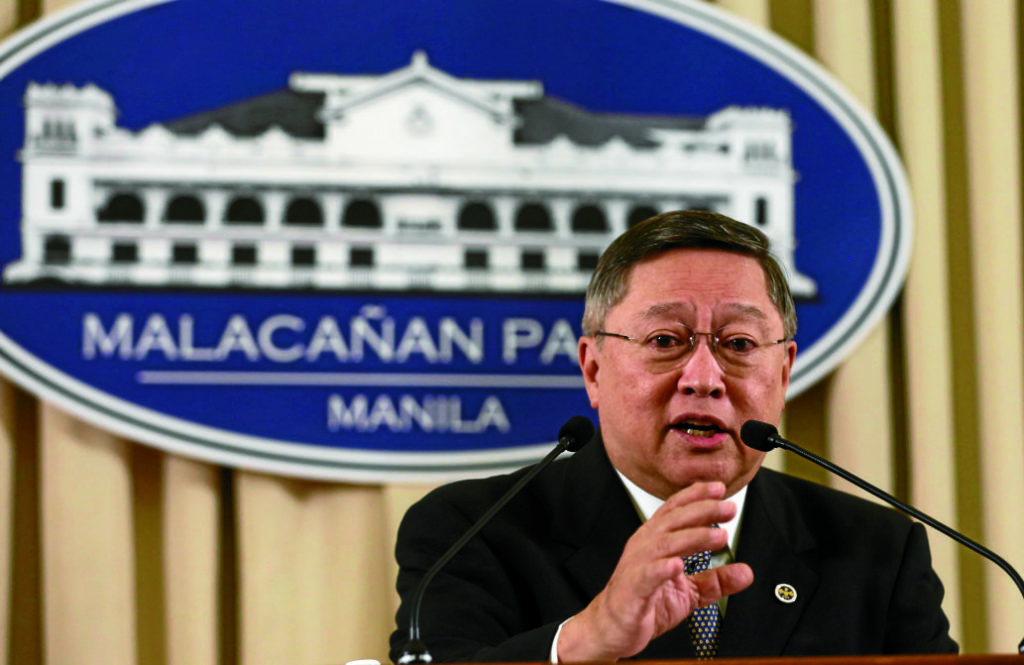The Department of Finance sees on-schedule implementation by January next year of the first package of the comprehensive tax reform program that will slash personal income tax rates and raise taxes on consumption after the Senate version was filed last Wednesday.
In a statement Friday, Finance Secretary Carlos G. Dominguez III thanked the Senate committee on ways and means chaired by Senator Sonny Angara for its endorsement for plenary the approval of Senate Bill No. 1592 or the upper house’s version of the Duterte administration’s Tax Reform for Acceleration and Inclusion (Train).
Dominguez said the DOF was grateful to the Senate ways and means committee “for its patience and commitment” to President Rodrigo Duterte’s comprehensive tax reform program.
Also, Dominguez said the DOF was “[looking] forward to working with [the panel] in the Senate plenary to finalize the Train bill in a form that will bring the most benefit to the people, while ensuring fiscal responsibility.”
“We respect the noble intention of the senators to amend the DOF proposal based on their learned judgment and after due consultation with stakeholders. In the coming weeks, this democratic process continues as the Senate debates the tax reform at the plenary level and as the bicameral conference reconciles the House and Senate versions,” Dominguez said.
The Lower House in May approved its version of Train under House Bill No. 5636.
“We hope the Senate will pass the Train on third reading before going into recess in mid-October, the bicameral conference to conclude in November, and the President to sign the bill into law by Dec. 15, 2017. This schedule will allow us to implement the tax reform on Jan. 1, 2018, so that the benefits of the reform can be felt at the soonest possible time,” according to Dominguez.
Under SB 1592, those earning P150,000 a year will be tax-exempt, while also retaining the P82,000 tax exemption for 13th month pay and other bonuses.
The Senate version has a lower tax-exempt threshold than HB 5636, which set it at an annual income of P250,000.
Also, those with up to four dependents will enjoy an additional exemption worth a maximum of P100,000.
This move will bring tax relief to 99 percent of the about 7.5 million individual taxpayers registered with the Bureau of Internal Revenue, Angara had said.
At present, only two million wage earners enjoy the tax-exempt perk, but under SB 1592, over six million government and private employees will pay no taxes.
The additional take home pay would be equivalent to a 14th-month pay, according to Angara.
Not only the employed but also the self-employed and entrepreneurs would enjoy lower tax rates as well as easier payment schemes under SB 1592.
For the self-employed, they will be given the option of either the flat 8-percent tax or the schedule of new income tax rates outlined for compensation earners, Angara had said.
Also, the Senate version of Train will provide relief to small business owners as it raised the value-added tax (VAT)-exempt threshold on the sale or lease of goods and services to P3 million from P1.9 million at present.
While the Senate version of the proposed tax reform package will still raise petroleum taxes, the incremental increase will be a slower at P1.75, P2 and P2.25 in the next three years compared with the House-approved P3 and P2 and P1.
For LPG, the increase will be increments of P1 in the next three years, while the exemption on kerosene was kept.
The additional excise tax on vehicles will still have five tiers just like HB 5636, while hybrid and electric cars will remain tax exempt.
While it will slap taxes on sugar sweetened drinks, SB 1592 nonetheless will exempt “3-in-1” coffee as well as milk from taxes.
The bill will also widen the VAT base by reducing exemptions, even as it retained those covering food production, healthcare, socialized housing, the business process outsourcing industry, persons with disabilities, as well as senior citizens.
The Senate bill will also earmark specific amounts for specific projects and programs, specifically the ambitious “Build, Build, Build” infrastructure plan as well as the rehabilitation of war-torn Marawi City.
SB 1592 was expected to result into net revenues of at least P134 billion in the first year of implementation, based on earlier estimates.
